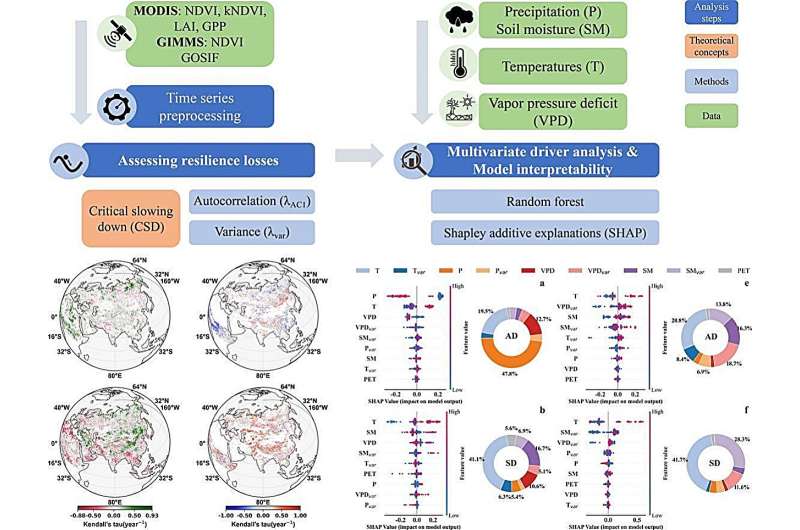A recent study conducted by the Chinese Academy of Sciences has revealed a surprising paradox across Eurasia: despite a visible increase in vegetation over recent decades, the underlying resilience of these ecosystems has weakened. This finding, published in the journal Ecological Indicators, challenges the prevailing narrative of environmental improvement and raises concerns about the future ecological stability of the continent.
Led by Professor Hao Xingming from the Xinjiang Institute of Ecology and Geography (XIEG), the research team analyzed the resilience of Eurasian ecosystems from 1984 to 2020. Using “critical slowing down” (CSD) indicators—a sophisticated metric for assessing a system’s ability to recover from disturbances—the study found that while vegetation greening has increased, ecosystem resilience has significantly declined since 2005.
Understanding the Paradox
The study utilized a comprehensive array of multi-source vegetation indices, including data from the Global Inventory Monitoring and Modeling Studies (GIMMS), Moderate Resolution Imaging Spectroradiometer (MODIS), and Orbiting Carbon Observatory-2 solar-induced chlorophyll fluorescence (GOSIF). This robust approach enabled researchers to validate the consistency of resilience indicators across different datasets, ensuring the reliability of their findings.
To uncover the driving forces behind these shifts, the researchers employed a sophisticated random forest model coupled with Shapley Additive Explanation (SHAP)—a cutting-edge technique for interpreting complex AI models. “Our findings demonstrate that resilience estimates derived from various key vegetation proxies, including the Normalized Difference Vegetation Index (NDVI), kernel NDVI (kNDVI), Leaf Area Index (LAI), Gross Primary Production (GPP), and solar-induced chlorophyll fluorescence (GOSIF), exhibit remarkably consistent spatial patterns and trends,” said Zhang Jingjing, the study’s first author. This consistency underscores the robustness of the observed resilience decline.
Drivers of Ecological Vulnerability
The study identified the primary culprits behind this ecological vulnerability. In humid regions, rising temperatures emerged as a primary driver of resilience decline. Conversely, in arid regions, variability in water availability proved to be the dominant factor compromising the ecosystems’ ability to bounce back from stress.
These findings provide a crucial reference for scientists and policymakers striving to understand the intricate relationship between vegetation dynamics and the inherent resilience of Eurasian terrestrial ecosystems. The study suggests that while greening might present a superficial improvement, it does not necessarily translate into a more robust ecological system.
Implications for Future Research and Policy
The implications of this study are profound. As the Northern Hemisphere continues to experience climate change, understanding the factors that contribute to ecosystem resilience becomes increasingly critical. The research highlights the need for targeted strategies that address the specific vulnerabilities of different regions, whether they are driven by temperature increases or water scarcity.
Experts suggest that future research should focus on developing adaptive management practices that enhance ecosystem resilience in the face of climate change. This includes investing in technologies and practices that can mitigate the impacts of temperature fluctuations and water variability, thereby supporting the long-term health of these ecosystems.
By the Numbers:
– Study Period: 1984-2020
– Key Metrics: NDVI, kNDVI, LAI, GPP, GOSIF
– Regions Analyzed: Humid and Arid Areas of Eurasia
As policymakers and environmentalists digest these findings, the study serves as a reminder that visible environmental changes do not always equate to improved ecological health. The path forward will require a nuanced understanding of the complex interactions between climate variables and ecosystem dynamics.
More information on this study can be found in the journal Ecological Indicators, with the full citation: Jingjing Zhang et al, Vegetation greening does not significantly enhance ecosystem resilience in the Northern Hemisphere, Ecological Indicators (2025). DOI: 10.1016/j.ecolind.2025.113762.
